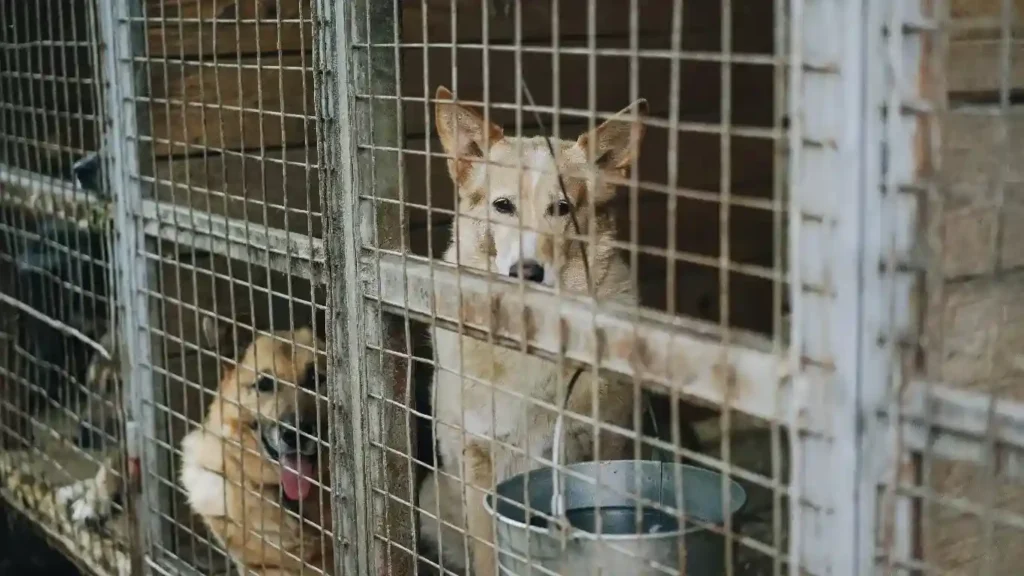The recent passage of a legislative bill in South Korea marks a significant stride toward the cessation of breeding, slaughtering, and commercializing dogs for human consumption, echoing evolving societal attitudes and an emerging wave of concern for animal welfare.

South Korea’s legislative body recently approved a bill targeting the cessation of breeding, slaughtering, and vending dogs for human consumption, marking a significant milestone for animal welfare advocates advocating for this change over an extended period.
The bill, endorsed by a vast majority in the National Assembly with 208 lawmakers voting in favor and two abstaining, signifies a notable shift in South Korea’s societal and political landscape concerning dog meat consumption and the industry that sustains it.
Once prevalent in local menus, the consumption of dog meat has progressively waned in popularity, coinciding with the surge in pet ownership and the widespread adoption of animal welfare concerns.
According to a 2022 Gallup Korea survey, over 60 percent of South Koreans disapprove of dog meat consumption, with only 8 percent reporting consumption within the previous year—a stark decrease from the 27 percent in 2015. Notably, younger demographics show a particularly pronounced aversion to this practice.
Following the Tuesday vote, proponents of animal rights hailed the bill’s passage as a pivotal moment in the country’s history. JungAh Chae, executive director of Humane Society International Korea, remarked, “I never thought I would see in my lifetime a ban on the cruel dog meat industry in South Korea.” The sentiment echoed widespread rejection of dog consumption among Korean citizens.
However, some dog farmers have expressed intentions to contest the bill in South Korea’s Constitutional Court.
Scheduled for implementation in 2027, the legislation mandates the prohibition of dog meat trading. Violation of these regulations could result in penalties, including up to three years of imprisonment or fines amounting to 30 million South Korean won ($22,800) for slaughtering dogs for consumption, and up to two years of imprisonment or a fine of 20 million won ($15,200) for breeding and selling dogs for human consumption. Importantly, the bill does not criminalize the act of consuming dog meat.
To aid in the transition away from the dog meat industry, businesses engaged in breeding, slaughtering, and selling dogs can seek government compensation upon outlining plans for operational closure or diversification into alternative industries. Organizations like Humane Society International Korea have supported dog farmers in transitioning to cultivating crops like blueberries, medicinal herbs, or parsley.
Opposition to the bill primarily stems from groups representing dog farmers, contending that the ban threatens their livelihoods and encroaches on personal rights. Despite declining consumption, some South Koreans still consume dog meat, particularly on “Boknal,” the hottest summer days, believing dishes like “bosintang” soup offer health benefits.
Critics like Son Won Hak, a farmer and former association leader, decry the bill as an infringement on occupational choice, signaling intentions to challenge its constitutionality through petitions.
Notably, government data cited by the Korea Times reveals 1,156 registered dog farms and 1,666 dog meat-selling restaurants annually, though industry representatives claim these figures could be significantly higher. Prior attempts to outlaw dog meat faced resistance, evident in a chaotic protest near the presidential palace in Seoul, where some demonstrators clashed with law enforcement.
Yet, a shift in public sentiment, partly influenced by increased pet ownership, has bolstered support for the bill. The Agriculture Ministry reported a surge in pet dog ownership from 1.3 million in 2018 to 3.02 million in 2022, underscoring evolving attitudes toward animal welfare.
President Yoon Suk Yeol and First Lady Kim Keon Hee, recognized for their advocacy for animal rights and pet ownership, have publicly supported the bill, with the First Lady expressing the belief that “dog meat consumption should come to an end” in an era where humans and pets coexist harmoniously.







